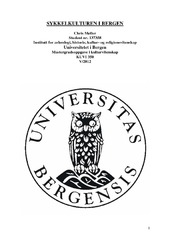| dc.description.abstract | This examination aims to show how perspectives within social science may be productively applied in order to enhance the knowledge with regard to bicycling culture in our local community, the city of Bergen, an elevate it to a higher level. This project is motivated by the fact that the national transport authorities, as well as the local authorities, aim to accommodate the infrastructures for bicycles, in an attempt to increase the level of cyclist. Further in this thesis I wish to argue that bicycling as a sustainable environmental form of transportation is adaptable for a city like ours where claims for space are issued continuously. Moreover, most parts of the city are within average cycling range. In the first part of this thesis, pedestrians, communication, safety and bicycling culture constitute the perspectives which function as a foundation for discussion. The Chapter 2 discusses actions performed within bicycling community from a phenomenological perspective through concepts of interaction provided by the sociologist Erving Goffman. In this second part of the analysis I will proceed to enlighten rituals and insults as well as the defence of the bicyclists’ “territories of the self” as the starting point for their negotiations of different procedures to sustain this territory. Bergen has some characteristics for interaction which shows that the competences witch are uncovered within this mobile practicality, is not just a question of being able to ride a bike but also includes a competence to interact in traffic. There will in addition to this analysis be provided examples where the bicyclists as an act of communication seek fellowship with groups which represent their own values and codes of behaviour in traffic, and rejects other bicyclist who do not share the same set of values. I wish to argue from this point of view, that these actions constitute the social field of bicycling culture in Bergen. Some of these practises are examined with reference to scientific interviews with the actors within the bicycling community. By using this method, the aim is to get an impression of their subjective point of view, their subjective interpretations of the traffic situation, and analyse them in the context of the expressions of mistrust towards the urban cyclists in local media. The intention is to examine if these conditions can be revealed through a qualitative method, in interpreting the empirical material. | en_US |
